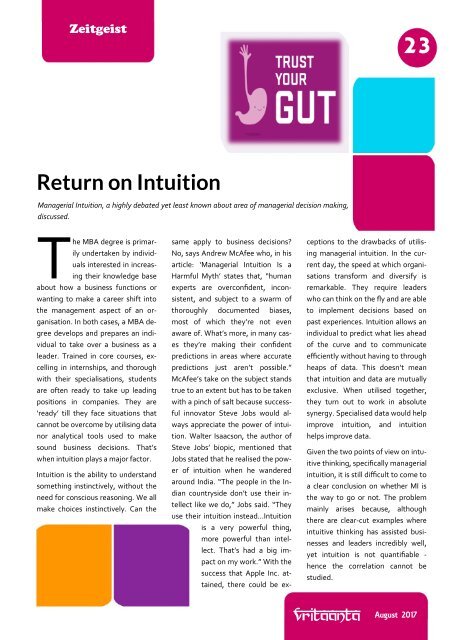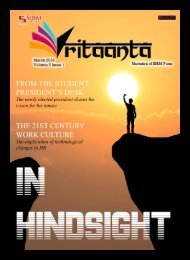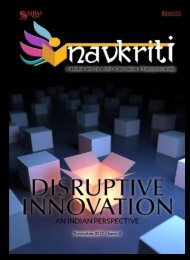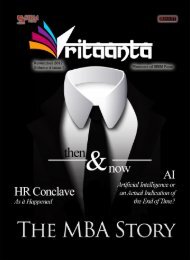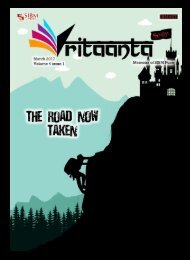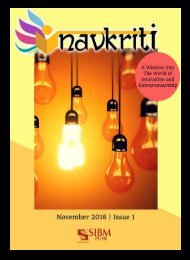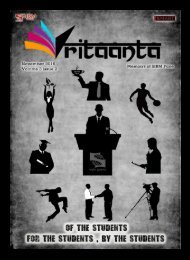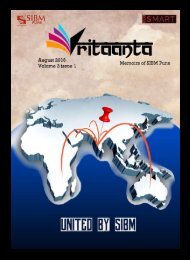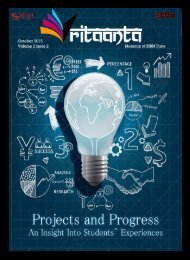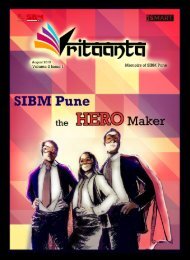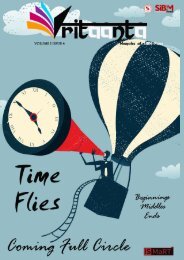Vritaanta Volume 4 Issue 2 August 2017
Pune was nicknamed “The Oxford of the East” by the Late Pandit Jawaharlal Nehru, who was impressed with the wide array of excellent educational institutes present in the city, and SIBM Pune remains a shining example of leading the way to maintain this sobriquet. SIBM Pune prides itself on being the hub of diversity, attracting students from various educational and professional backgrounds which lead to a diverse group - inviting ways of driving fresh thinking, new insights, and challenging perspectives. Apart from the corporate competitions; SIBM Pune had some innovative events and tournaments of our own. Explore more about Aarambh 2017 - a cultural event where student teams from SIBM Pune along with other sister institutes come together to showcase their talents. Colosseum, an inter batch competition with events like extempore, business quiz, group dances, music, and case studies while Hoopster and Dwandva catered to sports lovers.
Pune was nicknamed “The Oxford of the East” by the Late Pandit Jawaharlal Nehru, who was impressed with the wide array of excellent educational institutes present in the city, and SIBM Pune remains a shining example of leading the way to maintain this sobriquet. SIBM Pune prides itself on being the hub of diversity, attracting students from various educational and professional backgrounds which lead to a diverse group - inviting ways of driving fresh thinking, new insights, and challenging perspectives. Apart from the corporate competitions; SIBM Pune had some innovative events and tournaments of our own. Explore more about Aarambh 2017 - a cultural event where student teams from SIBM Pune along with other sister institutes come together to showcase their talents. Colosseum, an inter batch competition with events like extempore, business quiz, group dances, music, and case studies while Hoopster and Dwandva catered to sports lovers.
You also want an ePaper? Increase the reach of your titles
YUMPU automatically turns print PDFs into web optimized ePapers that Google loves.
Zeitgeist<br />
23<br />
Return on Intuition<br />
wanting to make a career shift into<br />
the management aspect of an organisation.<br />
In both cases, a MBA degree<br />
develops and prepares an individual<br />
to take over a business as a<br />
leader. Trained in core courses, excelling<br />
in internships, and thorough<br />
with their specialisations, students<br />
are often ready to take up leading<br />
positions in companies. They are<br />
‘ready’ till they face situations that<br />
cannot be overcome by utilising data<br />
nor analytical tools used to make<br />
sound business decisions. That’s<br />
when intuition plays a major factor.<br />
Intuition is the ability to understand<br />
something instinctively, without the<br />
need for conscious reasoning. We all<br />
make choices instinctively. Can the<br />
Managerial Intuition, a highly debated yet least known about area of managerial decision making,<br />
discussed.<br />
T<br />
he MBA degree is primarily<br />
undertaken by individ-<br />
No, says Andrew McAfee who, in his ing managerial intuition. In the cur-<br />
same apply to business decisions? ceptions to the drawbacks of utilisuals<br />
interested in increasing<br />
their knowledge base Harmful Myth’ states that, “human sations transform and diversify is<br />
article: ‘Managerial Intuition Is a rent day, the speed at which organi-<br />
about how a business functions or experts are overconfident, incon-<br />
remarkable. They require leaders<br />
sistent, and subject to a swarm of<br />
thoroughly documented biases,<br />
most of which they’re not even<br />
aware of. What’s more, in many cases<br />
they’re making their confident<br />
predictions in areas where accurate<br />
predictions just aren’t possible.”<br />
McAfee’s take on the subject stands<br />
true to an extent but has to be taken<br />
with a pinch of salt because successful<br />
innovator Steve Jobs would always<br />
appreciate the power of intuition.<br />
Walter Isaacson, the author of<br />
Steve Jobs’ biopic, mentioned that<br />
Jobs stated that he realised the power<br />
of intuition when he wandered<br />
around India. “The people in the Indian<br />
countryside don’t use their intellect<br />
like we do,” Jobs said. “They<br />
use their intuition instead...Intuition<br />
is a very powerful thing,<br />
more powerful than intellect.<br />
That’s had a big impact<br />
on my work.” With the<br />
success that Apple Inc. attained,<br />
there could be ex-<br />
who can think on the fly and are able<br />
to implement decisions based on<br />
past experiences. Intuition allows an<br />
individual to predict what lies ahead<br />
of the curve and to communicate<br />
efficiently without having to through<br />
heaps of data. This doesn’t mean<br />
that intuition and data are mutually<br />
exclusive. When utilised together,<br />
they turn out to work in absolute<br />
synergy. Specialised data would help<br />
improve intuition, and intuition<br />
helps improve data.<br />
Given the two points of view on intuitive<br />
thinking, specifically managerial<br />
intuition, it is still difficult to come to<br />
a clear conclusion on whether MI is<br />
the way to go or not. The problem<br />
mainly arises because, although<br />
there are clear-cut examples where<br />
intuitive thinking has assisted businesses<br />
and leaders incredibly well,<br />
yet intuition is not quantifiable -<br />
hence the correlation cannot be<br />
studied.<br />
VRITAANTA<br />
<strong>August</strong> <strong>2017</strong>


